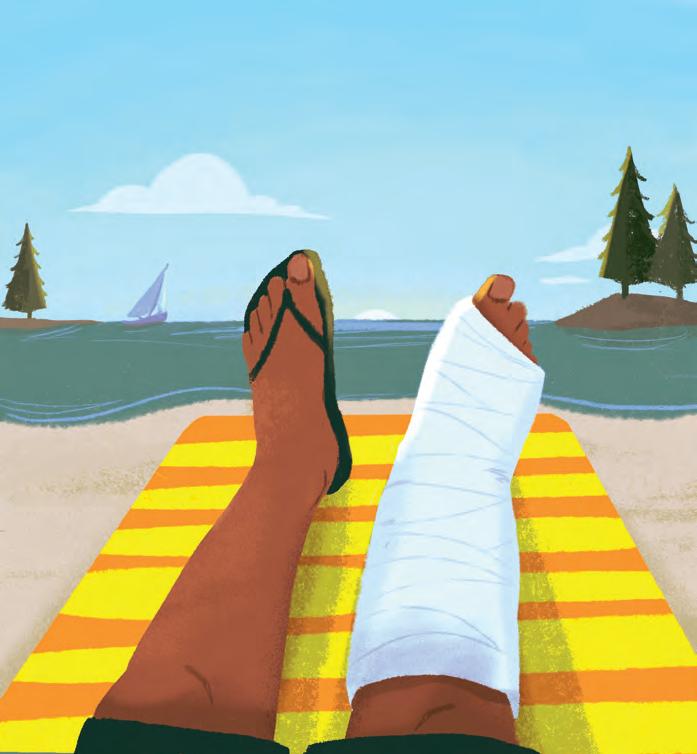
3 minute read
Safe Travels Tips for keeping healthy this summer
BY KRYSTEN GODFREY MADDOCKS / ILLUSTRATION BY GLORIA DIIANNI
pared to have those on hand prior to travel, Dayno says.
Elliot Hospital, part of the SolutionHealth system, uses the Epic electronic medical records system, which holds the medical records of most patients in the United States and can “talk” to any health care system that uses that system. If you have an app on your phone that gives you access to your medical records, it will help get you the right medications and assist any health care provider who may need to treat you, says Dr. Brett Sweeney, an emergency medicine doctor and medical director of the emergency department at Southern New Hampshire Medical Center in Nashua, also part of SolutionHealth. Even if you don’t have an EMR app, you can also protect yourself by plugging health information into your smartphone.
“The iPhone wellness app lets you go in and put all of your pertinent information, so if you’re assessed during an emergency, we have a list of all your allergies and medical history,” Sweeney says.
Whether you’re envisioning an action-packed vacation or one that mostly involves lounging in your beach chair, emergencies can pop up any time you travel. Visits to the emergency room ramp up as temperatures rise. Top reasons for emergency visits in the Granite State include injuries incurred by car and motorcycle accidents, sunburn, heat exhaustion and tick bites. While you can’t anticipate accidents or illnesses, you can stay safe during your vacation by planning accordingly and knowing what to do in the event of an injury or health scare.
Engage in Pre-Trip Recon Planning ahead can be your best course of action to avoid an emergency room visit.
Even if you’re staying closer to home, you should understand your medical conditions and the medicines you should take along with you, according to Dr. Matt Dayno, an emergency medicine doctor and medical director of the emergency department at Elliot Hospital in Manchester. He also suggests bringing a list of your medications and any allergies you might have. Should you forget your medication or suffer from allergies while you’re away, there are actions you can take.
“If you have an existing relationship with a primary care provider in your region, reach out to them first,” Dayno says. “Many prescriptions can easily be called into a local pharmacy if it’s an existing medication.”
However, controlled drugs can’t be called into a pharmacy, and you should be pre-
Preparing for health care emergencies can be trickier if you’re traveling outside the United States. While health insurance usually covers you throughout the country, that’s often not the case if you travel internationally. Sweeney suggests that travelers strongly consider buying international trip insurance.
“If you’re seriously injured, and you need to get back to the U.S., that would be your insurance coverage,” he says. “When you’re young and healthy, you think it can’t happen to you, but as you get older, you need to think about these things.”
When the Unexpected Happens
Emergency rooms are notorious for long waits, but there are alternatives. Oftentimes, less serious injuries or health concerns — such as sprains, cuts, insect bites and ear infections — can be treated in an urgent care, or “immediate care” setting. Dr. Dayno encourages travelers to map out urgent care locations before they arrive at their vacation destinations. He also warns that not all urgent care centers are staffed with emergency physicians, and some might not be open when you need them. The three Elliot Urgent Care centers in Bedford, Londonderry and Manchester are all overseen by board-certified emergency physicians, he says, whereas others might be staffed with family practice providers or physician assistants.
“You can go on our online portal and preschedule an appointment for same-day, based upon the volume of patients we’re seeing,” he says. “It’s helpful for staff and patients to be aware of the timing of their arrival. We take walk-ins, too.”
You may need to visit a hospital emergency department for major injuries and illnesses. Although people faced long wait times over the winter, Sweeney says staffing has improved over the past few months.
“Rest assured, if you show up to the emergency room and require immediate care, you’ll get priority first,” he says.
In response to the COVID pandemic, Elliot Hospital recently doubled the size of its emergency room, adding 28 new private patient exam rooms, three new state-of-theart trauma rooms, three new triage rooms and nine new dedicated bays for rapid triage and treatment.
“We are better equipped for enhanced infection prevention and handling surges in demand,” said Kelly Scargill, SolutionHealth’s public relations and communications director. “We made modifications to allow us to better isolate infectious patients, increase ventilation and air filtration systems, and add additional oxygen ports to care for an increased number of patients, making it better equipped to handle future surges in demand for care.”
Smart Choices Make for Safer Travel
It’s easy to let your guard down while you’re enjoying much-needed R&R. And it can be scary to contemplate requiring medical care away from home. However, thinking ahead and making wise choices can keep you safer and healthier. Here are a few tips from the Centers for Disease Control:
Remember to reapply sunscreen and stay out of the sun during peak hours to avoid sunburn and heat stroke.
Pay close attention to loved ones during










